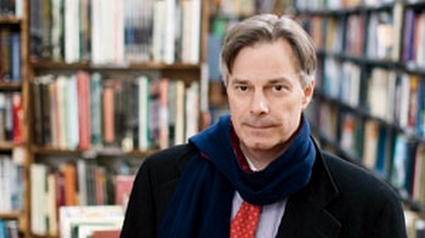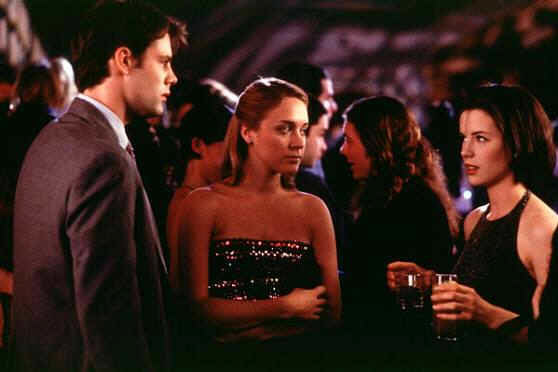Here’s the piece about Whit Stillman that I wrote for Civilization in 1998. It breathes the air of another time, and of course the costume drama mentioned toward the end never got made…but I still like it anyway.
* * *
 Contrary to conventional highbrow wisdom, there are plenty of smart movies being made nowadays: they’re just not being made in Hollywood. Most of the American films I’ve liked best in the past couple of years–Kevin Smith’s Chasing Amy, Doug Liman’s Swingers, Greg Mottola’s The Daytrippers, Daisy von Scherler Mayer’s Party Girl–have been small-scale productions, often shot in and around New York, whose characters spend much of their on-screen time conversing about romance and its discontents. These chatty comedies, which are nothing if not smart, are the product of a youth-oriented urban subculture whose most gifted member, unlikely as it may sound, is 46-year-old Whit Stillman, who writes, directs and produces wonderfully funny movies about the awkward love lives of what one of his characters calls the “urban haute bourgeoisie.”
Contrary to conventional highbrow wisdom, there are plenty of smart movies being made nowadays: they’re just not being made in Hollywood. Most of the American films I’ve liked best in the past couple of years–Kevin Smith’s Chasing Amy, Doug Liman’s Swingers, Greg Mottola’s The Daytrippers, Daisy von Scherler Mayer’s Party Girl–have been small-scale productions, often shot in and around New York, whose characters spend much of their on-screen time conversing about romance and its discontents. These chatty comedies, which are nothing if not smart, are the product of a youth-oriented urban subculture whose most gifted member, unlikely as it may sound, is 46-year-old Whit Stillman, who writes, directs and produces wonderfully funny movies about the awkward love lives of what one of his characters calls the “urban haute bourgeoisie.”
Stillman has been dubbed the Woody Allen of WASPdom, a comparison which does him no justice (though it’s increasingly a compliment to Allen). To be sure, his first two films, Metropolitan (1990) and Barcelona (1994), featured a cast of upper-class snobs who at first glance seemed in their own way as insular as the neurotic New Yorkers of Manhattan or Deconstructing Harry. But the problems of Stillman’s well-heeled, angst-ridden twentysomethings, it turned out, had as much to do with age as class: fresh out of school, they found themselves swept up in a complicated, unforgiving world for which their sheltered lives had left them unprepared. This melancholic exchange between two Stillman preppies, one in his early twenties and the other in his late forties, says everything about the rarefied milieu in which his films are set: “Do you think it’s true that, generally speaking, people from this sort of background are doomed to failure?” “‘Doomed’? That would make it easier. We just fail, without being doomed, which is worse.”
Metropolitan and Barcelona are both sparkling comedies, and not the kind you’d expect from a member in good standing of the urban haute bourgeoisie, either. For one thing, Stillman views his characters’ angst with wry detachment. “These people have nothing to pity themselves about,” he says firmly. “They should not be in a situation where they’re feeling sorry for themselves.” In any case, his real interest is not in old money but young love, and how it has fared in the wake of the sexual revolution. The debutantes of Metropolitan have barely discovered sex, while the leading men of Barcelona are obsessed with it; both are anxiously searching for the right thing to do in a culture without rules. That’s what makes his movies every bit as much a part of the indie-flick subculture as, say, Kevin Smith’s Clerks, an edgy, sexually blunt comedy set in a convenience store somewhere in deepest New Jersey: Stillman’s long-winded preppies and yuppies, just like Smith’s grubby Gen-X slackers, are lost in postmodern America, looking for an exit sign.
The Last Days of Disco, Stillman’s third and latest film, brings the lost souls of Metropolitan and Barcelona still closer to the present: it is set in the early ’80s, just before ordinary people stopped worrying about herpes and started worrying about AIDS. Alice Kinnon (Chloe Sevigny) and Charlotte Pingress (Kate Beckinsale) work at menial jobs in publishing during the day, then party every night at a trendy club not unlike Studio 54. They pretend to be sexually experienced, though nothing could be further from the truth (Alice, in fact, turns out to be what used to be called a “technical” virgin), because they assume that such knowledge is expected of them. The consequences of their deception turn out to be no laughing matter–they disrupt their own lives and inadvertently hurt the equally inexperienced men whose paths they cross–but Stillman tells their tale with the lightest of touches, and what starts out as a witty sendup of the club scene soon turns unexpectedly poignant and involving.
 The filmmaker lives in a Greenwich Village apartment surrounded by avant-garde art galleries, far from the tony Park Avenue addresses from which most of his characters originally hail (though few of them end up going back there). He was busy doing a last-minute cleanup job on the soundtrack when I visited him, but even though the film’s release date was mere days away, he seemed perfectly happy to take an hour off from his frenzied search for the perfect set of church bells to dub into the climactic scene.
The filmmaker lives in a Greenwich Village apartment surrounded by avant-garde art galleries, far from the tony Park Avenue addresses from which most of his characters originally hail (though few of them end up going back there). He was busy doing a last-minute cleanup job on the soundtrack when I visited him, but even though the film’s release date was mere days away, he seemed perfectly happy to take an hour off from his frenzied search for the perfect set of church bells to dub into the climactic scene.
Stillman doesn’t talk in the earnest, slightly stilted manner of a Whit Stillman character. Though he is soft-spoken to the point of occasional inaudibility, it doesn’t take much to get him wound up, at which point the words start gushing forth like water from a fire hose, leaving the interviewer with nothing to do except keep one eye on the tape recorder and hope the batteries hold out. I asked him, for example, if he watched other people’s movies, and got this airport-circling reply: “I like very much the New York school of independent film comedy. Nancy Savoca, Jim Jarmusch when he’s funny, Tom DiCillo’s Living in Oblivion–things like that. I loved Babe. And I like big Hollywood action films, if they’re honest. I liked Air Force One and Apollo 13. I loved the films that John Ford and Hitchcock made, too, but I can’t really relate them to anything I do. I’m from the TV generation, and for me the problem was, where can you go to tell stories within your limitations? I read F. Scott Fitzgerald when I was 16, and decided I wanted to be a novelist, but I wasn’t cut out for it. I didn’t think logically, and I couldn’t do voices, or create an omniscient narrator–I had to write everything in the first person.
“Then I found an alternative in the sitcoms of the 60’s and 70’s. They really seemed to deal with life, but in a very funny way, and were unpretentious about it. When I started trying to write scripts instead of novels, it was completely liberating. The voice of each character is a first-person voice, but it’s not me: an actor or actress is going to play it, which means that somehow I’m not really responsible for it. I didn’t have to think logically, either. In fact, not going from A to B to C is much better in film comedy. If you think in terms of non sequitur, it’s a little less boring.”
Stillman is unapologetic about the fact that his movies consist primarily of people talking to one another. “Some visual purists still think film is pictures at an exhibition,” he says. “They seem to forget that we’ve been making sound films ever since the ’20s. Talk is incredibly important. If you want to make a movie about what people are like, you have to show how they talk and what they say. I make romantic comedies about fairly young people, and Erik Erikson says somewhere that young love is almost all conversation: people holding mirrors up to each other though conversation, trying to figure out who they are and who the other person is, and whether there’s something that can link the two. If they couldn’t talk, it would be just awful. Of course you have to be very careful with it, and I understand why all the screenwriting gurus warn against too much dialogue, but I think they’re making a mistake. Even action films often have very good dialogue, though there isn’t necessarily a lot of it. What’s the charm of a buddy comedy? Just to see two guys shooting bullets? It’s what the two guys say to each other that matters.”
Stillman’s Theory of the Buddy Movie is about to be put to the test, minus the bullets: his next movie will be an old-fashioned costume drama. “I plan to go back to the 18th century,” he says, “and write a dramatic story that has adventure elements. I think I know how not to make it stilted and affected, but what I don’t quite know how to get around yet is how to make it interesting if there’s nothing funny in it. I think there can be funny stuff in it, but the engine has to be dramatic.” It’ll be quite a departure for the maker of The Last Days of Disco, but if anyone can put a new twist on swordplay and swashbuckling, it’s Whit Stillman, the poet of urban haute-bourgeois anxiety.
